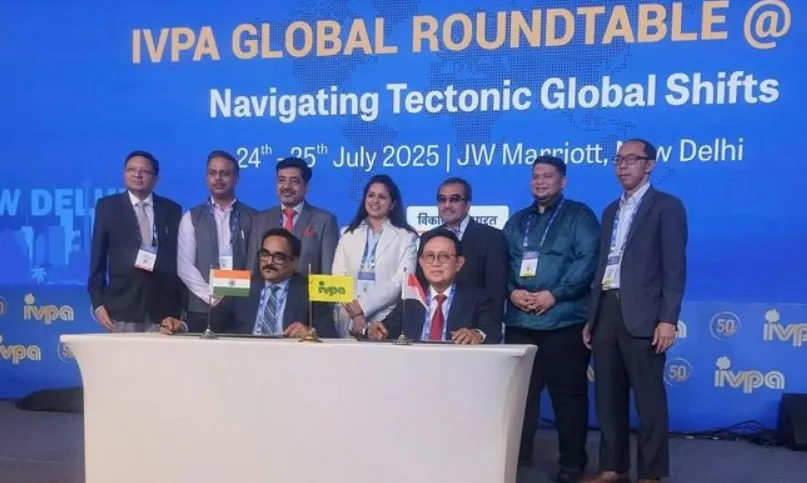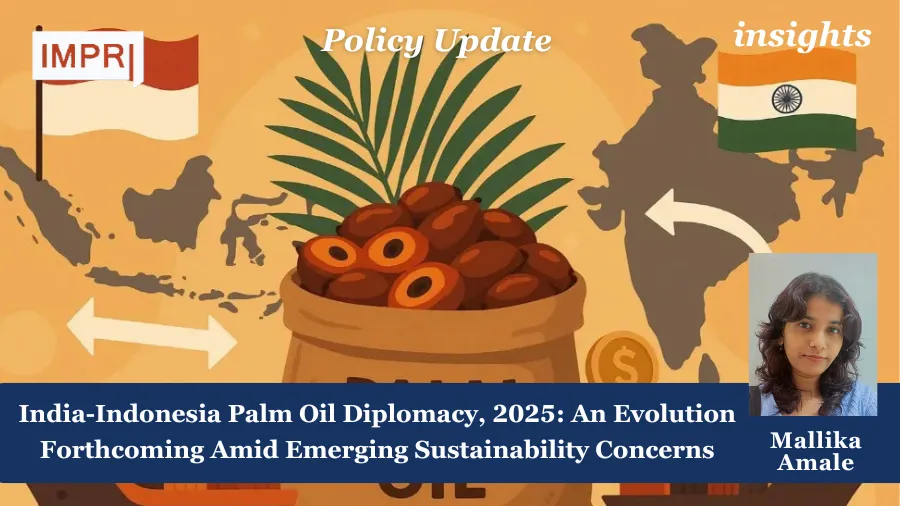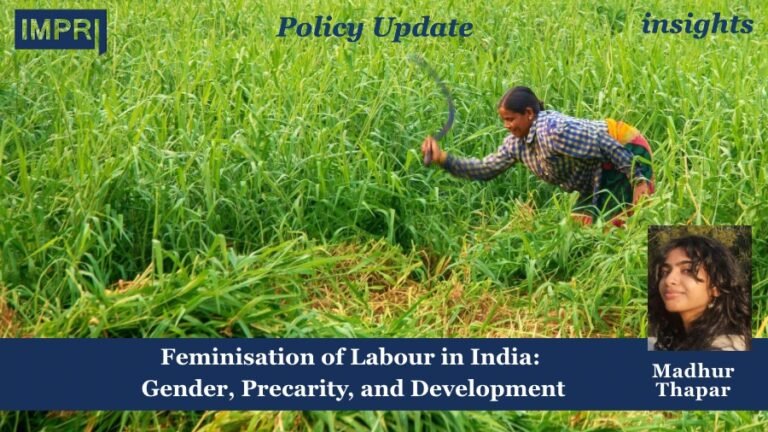Policy Update
Mallika Amale
For nearly 75 years, India and Indonesia have shared strong bilateral ties spanning political, cultural, and economic cooperation. A key pillar of their relationship is the robust palm oil trade, which has become a cornerstone of economic diplomacy for both nations. In 2024, trade between the two reached USD 26 billion, with palm oil and its derivatives alone accounting for USD 4.4 billion of the total. With an output of about 46 million metric tons in 2024-25, accounting for 4.5 percent of its GDP, Indonesia reaffirmed its position as one of the top global producers of crude palm oil.
India has primarily relied on Indonesia for imports of palm oil, and in 2024 these imports amounted to 4.2 million metric tonnes. Palm oil is ubiquitous in India, as it is globally. In general, India has been the largest consumer of edible oil, at the rate of about 25 million tonnes in 2024, with over 9 million tonnes being palm oil alone. Moreover, consumption is expected to increase in the festival season in the second half of the year. All these factors present both countries with an opportunity to foster deeper cooperation in palm oil diplomacy. Yet, it is important that this cooperation evolves in tandem with nuanced concerns such as promoting sustainable production practices and mitigating the impact of price and supply chain disruptions. Evidently, some positive strides have been taken in the past couple of years, such as the Indian Vegetable Oil Producers’ Association (IVPA) and the Indonesian Palm Oil Association (IPOA) signing an MoU (Memorandum of Understanding) in July 2025 to bring about “a future-ready, transparent palm oil supply chain that benefits consumers and producers alike.”

(Source: Gabungan Pengusaha Kelapa Sawit Indonesia (GAPKI) Indonesian Palm Oil Association (IPOA))
Functioning
Palm oil trade between India and Indonesia continues to be conducted through multiple bilateral and multilateral arrangements. Trade in the agriculture sector, including palm oil, expanded under the India-Indonesia Comprehensive Economic Cooperation Agreement (CECA). Also, the ASEAN-India Free Trade Agreement (FTA) increased trade flows through trade facilitation measures and preferential tariffs. Multilateral institutions like the G20 and WTO have helped solve palm oil-related issues. Moreover, joint working groups or groups on sustainability have been established, such as the Biennial Trade Ministersʼ Forum (BTMF), the India-Indonesia Working Group on Trade and Investment (WGTI), and the Economic and Financial Dialogue (EFD), to name a few.
The IVPA and IPOA, two key industrial bodies, play a central role in palm oil diplomacy. The IVPA acts in the interest of refiners, processors, traders, and importers of edible oils in India. It provides policy recommendations to the government as well as helps stabilise Indian markets. Making sure the private sector is included in bilateral trade talks, the IVPA also represents Indian consumers by maintaining affordability. While on the other hand, the IPOA does the same for Indonesian palm oil growers, refiners, and exporters. The decisions IPOA makes regarding pricing and supply have a direct impact on Indian markets.
Another crucial factor in determining India’s trade outlook with Indonesia is its tariff policies. Historically, India has maintained a calibrated tariff policy to protect the livelihoods of domestic farmers. It is important to maintain a pragmatic approach that balances support for Indian production with tariff regulation. Global price fluctuations also play a huge part. Numerous factors, such as weather disruptions or competing edible oil prices (of soybean oil, sunflower oil, etc.) affect bilateral negotiations and engagements.
Indonesia uses its dominant position in palm oil production as a tool of economic diplomacy. It has the power to shape global discourse on palm oil, as is evident by its measures like pursuing membership in the Council of Palm Oil Producing Countries (CPOPC) and expanding economic and trade relations with various other developing economies. It also gains significant leverage while negotiating other trade and investment agreements. Meanwhile, India sees this as an opportunity to safeguard trade flows and ensure food security.
Performance
Palm oil trade has generally been stable between India and Indonesia. However, challenges emerged when the Russia-Ukraine war began and in an effort to stabilise domestic prices of palm oil, Indonesia imposed an export ban temporarily.
India was imposing a 20 percent customs duty on crude palm oil, which in July 2025, was lowered to 10 percent. Following this move, the Indonesia Palm Oil Council (IPOC) expected palm oil exports to surpass 5 million tonnes in 2025. But this may prove challenging because of India’s highly price-sensitive market. An increase in palm oil prices and a decrease in soyoil prices saw imports fall about 15.9 percent month-on-month in September to 833,000 metric tons, the lowest since May 2025.
India is pushing to achieve self-sufficiency in the edible oils market, including palm oil, largely due to global price volatility and the ever-increasing domestic demand. This adds a whole another dimension to India-Indonesia palm oil diplomacy, presenting both nations with an opportunity to expand cooperation beyond just trade. India introduced the National Mission on Edible Oils-Oil Palm (NMEO-OP) to increase cultivation of palm trees from current levels of 350,000 hectares to 1 million hectares by 2025-26 in the northeast and island regions. India has already bought about 500,000 seeds from Indonesia in 2023-24, with 100,000 more expected in 2025. Hence, the dynamics of palm oil diplomacy may transform between both, with India’s self-sufficiency push and Indonesia providing technical assistance.
Impact
The meaning of palm oil diplomacy has evolved in both economies. Palm oil imports have generally offered India an affordable means of fulfilling the edible oil market demand in a country with increasing demand and consumption of palm oil. But in the past few months, concerns regarding price-sensitive Indian markets and excessive reliance on imports that negatively impact Indian domestic palm oil producers have come to the forefront. For Indonesia, palm oil exports to India are a reliable source of revenue. Palm oil accounts for approximately 4-5 percent of Indonesia’s GDP and employs millions of small farmers.
Increasing palm oil production and trade have their own challenges, such as concerns related to labour rights, deforestation, land disputes, and greenhouse gas emissions. Indonesia has recently faced global criticism for large-scale forest destruction due to oil palm plantations. India is also pushing for adoption of sustainable practices in the production and cultivation of palm oil.
Emerging Issues
- Increasing Sustainability Demands: Both India and Indonesia are under pressure to reduce emissions from palm oil production and reduce pollution and deforestation. In September 2025, Indonesia signed a Comprehensive Economic Partnership Agreement with the European Union (EU). Under this agreement, the recently enacted “European Union Deforestation Regulation” has made it a requirement for suppliers of palm oil commodities to meet sustainability standards in order to gain access to EU markets. This trend is likely to strengthen in the coming years. On the other hand, India has signed a MOU with the Roundtable on Sustainable Palm Oil (RSPO) in July 2024 to promote sustainable cultivation practices and palm oil imports, agreeing to work on “raising awareness, promoting sustainable practices, conducting research, and advocating for supportive policies in the palm oil industry.”
- Inconsistent Taxation and Tariff Policy in India: Since July 2022, the government has imposed heavy restrictions on tax credit refunds, namely the Input Tax Credit, which creates cash flow problems for SMEs (Small and Medium Enterprises). The IVPA has therefore asked the government to remove these restrictions that hamper production and capital requirements of SMEs. Moreover, predicting exports becomes challenging for Indonesia when India imposes inconsistent tariffs. It is important to hold intensive policy dialogue to maintain regular and consistent tariff regulations.
- Lack of Consumer Awareness in India: Indian consumers are increasingly becoming aware of the health implications of palm oil, often having the wrong perception that palm oil is inferior or unhealthy compared to other vegetable oils. This is detrimental to the long-term acceptability of palm oil.
- Domestic Pressures in India: India has initiated programs such as the National Mission on Edible Oils-Oil Palm (NMEO-OP) to reduce its import dependency for edible oils. This means increasing palm oil cultivation locally, but it has raised sustainability concerns due to the crop’s high water needs.
- Geopolitical Shocks: The Russia-Ukraine war has disturbed global vegetable oil supply chains, heightening volatility in edible oils. Palm oil, as an alternative, has become even more crucial, further making India’s reliance on Indonesian supply both a strategic imperative and a weakness. The Indian edible oils market is price sensitive as it is; thus, global price or supply chain disruptions will prove challenging to India’s economy.
Way Forward
Palm oil diplomacy between India and Indonesia has consolidated economic relations and food security goals within both economies while also providing opportunities to collaborate on issues pertaining to sustainability. As India pursues its goal of self-sufficiency and Indonesia navigates its domestic economic and environmental priorities, palm oil cooperation between them is not signalling a decline but rather an evolution of the bilateral relationship. Indonesia can help guide India by sharing technical expertise. Cooperation by sharing palm seeds has already begun, and this can be taken to the next level by working together on sustainability, technology exchange, and strengthening supply chains and logistics.
India must balance palm oil imports with domestic cultivation and markets. Also, investment in oilseeds such as mustard, soybean, and sunflower can bring alternatives to palm oil reliance. It is long overdue for India’s food and trade security policy to reflect its alignment with its climate and sustainability targets. The focus should shift to importing and ensuring domestic consumption of only certified sustainable palm oil. The Indian private sector can set a good example, especially the FMCG sector and food processing industries, by taking the lead by adopting sustainable sourcing of palm oil. Also, adoption of RSPO-certified palm oil by the industry as a whole will set a standard.
India and Indonesia must find common initiatives to support sustainable palm oil cultivation and trade. This can take the form of technology transfer for more effective plantation management, investment in traceability systems, and financial support for smallholders to meet sustainability standards.
Moreover, palm oil diplomacy needs to be practiced in multilateral institutions. India needs to increase its efforts with the G20, ASEAN, and other institutions to promote policies that take both sustainable environments and economic growth into account. These partnerships can ensure that palm oil serves as a facilitator rather than a hindrance to international cooperation.
References
- AgriBusiness. (2025, July 25). Palm Oil gets green mandate as India and Indonesia align on sustainable supply chains. Agro Spectrum India. https://agrospectrumindia.com/2025/07/25/palm-oil-gets-green-mandate-as-india-and-indonesia-align-on-sustainable-supply-chains.html
- Early, C. (2025, September 29). How forced labour and land grabs remain sticky issues for palm oil. Reuters. Retrieved October, 2025, from https://www.reuters.com/sustainability/society-equity/how-forced-labour-land-grabs-remain-sticky-issues-palm-oil–ecmii-2025-09-29/
- Export Inspection Council, India. (n.d.). AGREEMENT ON TRADE IN GOODS UNDER THE FRAMEWORK AGREEMENT ON COMPREHENSIVE ECONOMIC COOPERATION BETWEEN THE REPUBLIC OF INDIA AN. Export Inspection Council. https://eicindia.gov.in/WebApp1/resources/PDF/India-Asean.pdf
- Foreign Agricultural Service. (n.d.). Production – Palm Oil. USDA Foreign Agricultural Service. https://www.fas.usda.gov/data/production/commodity/4243000
- GHOSAL, S. (2025, September 30). Edible oil imports decline: IVPA pushes for India’s self-sufficiency. The Economic Times. Retrieved October 5, 2025, from https://economictimes.indiatimes.com/industry/cons-products/food/edible-oil-imports-decline-ivpa-pushes-for-indias-self-sufficiency/articleshow/124236107.cms
- Guild, J. (2025, October 7). The Indonesia-EU Free Trade Agreement, Explained. The Diplomat. https://thediplomat.com/2025/10/the-indonesia-eu-free-trade-agreement-explained/
- Indonesia Palm Oil Association. (2025, August 25). Palm Oil in 2025: Driving India-Indonesia Trade & Sustainable Growth. Gabungan Pengusaha Kelapa Sawit Indonesia (GAPKI). https://gapki.id/en/news/2025/08/25/palm-oil-in-2025-driving-india-indonesia-trade-sustainable-growth/
- Indonesia Palm Oil Association. (2025, October 3). INDEF: Indian Palm Oil Market Starts Demanding Sustainability. Gabungan Pengusaha Kelapa Sawit Indonesia (GAPKI). Retrieved 2025, from https://gapki.id/en/news/2025/10/03/indef-indian-palm-oil-market-starts-demanding-sustainability/
- Indonesia: Sustainable Palm Oil. (n.d.). United Nations Development Programme. Retrieved October, 2025, from https://www.undp.org/foodsystems/indonesia-sustainable-palm-oil
- Milling Middle East & Africa. (2025, October 3). India: Edible oil imports ease as IVPA accelerates India’s self-sufficiency push. UkrAgroConsult. Retrieved October, 2025, from https://ukragroconsult.com/en/news/india-edible-oil-imports-ease-as-ivpa-accelerates-indias-self-sufficiency-push/
- Ministry of External Affairs. (2024, December). BRIEF ON INDIA-INDONESIA BILATERAL RELATIONS. Ministry of External Affairs, Government of India. https://www.mea.gov.in/Portal/ForeignRelation/India-Indonesia-_Bilateral.pdf
- Press Trust India. (2025, July 29). Indonesia expects palm oil exports to India to exceed 5 mn-tonnes mark in 2025: IPOC Chairman. The Economic Times. Retrieved October 5, 2025, from https://economictimes.indiatimes.com/news/economy/foreign-trade/indonesia-expects-palm-oil-exports-to-india-to-exceed-5-mn-tonnes-mark-in-2025-ipoc-chairman/articleshow/122971338.cms?from=mdr
- Press Trust India. (2025, August 24). Vegetable oils body seeks removal of GST refund restrictions. The Economic Times. Retrieved October, 2025, from https://economictimes.indiatimes.com/news/economy/policy/vegetable-oils-body-seeks-removal-of-gst-refund-restrictions/articleshow/123488350.cms?from=mdr
- Reuters. (2025, October 3). India’s September palm oil imports hit 4-month low, soyoil jumps to 3-year high. The Economic Times. Retrieved October 5, 2025, from https://economictimes.indiatimes.com/news/economy/foreign-trade/indias-september-palm-oil-imports-hit-4-month-low-soyoil-jumps-to-3-year-high/articleshow/124286962.cms
- Roundtable on Sustainable Palm Oil. (2024, July 22). RSPO Partners with Indian Vegetable Oil Producers’ Association (IVPA) to Promote Sustainable Cultivation and Palm Oil Imports in India. Roundtable on Sustainable Palm Oil. https://rspo.org/rspo-partners-with-indian-vegetable-oil-producers-association-ivpa-to-promote-sustainable-cultivation-and-palm-oil-imports-in-india/
About the Contributor
Mallika Amale is currently interning at IMPRI. She is pursuing a Master’s in International Relations and Strategic Studies from the School of International Relations and Strategic Studies (SIRSS) at the University of Mumbai. Her research interests include India’s foreign policy, maritime security in the Indian Ocean Region, and the Indo-Pacific.
Acknowledgement
The author sincerely thanks the team at IMPRI for their valuable guidance, as well as my peers for their support during the whole process.
Disclaimer
All views expressed in the article belong solely to the author and not necessarily to the organisation.
Read more at IMPRI
India–Singapore Fintech and Digital Payments Collaboration 2025




